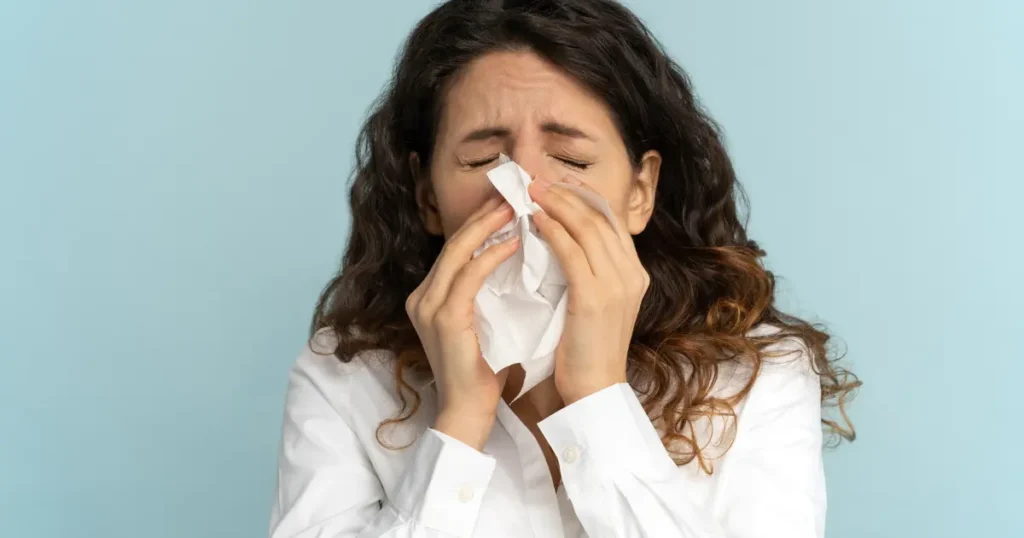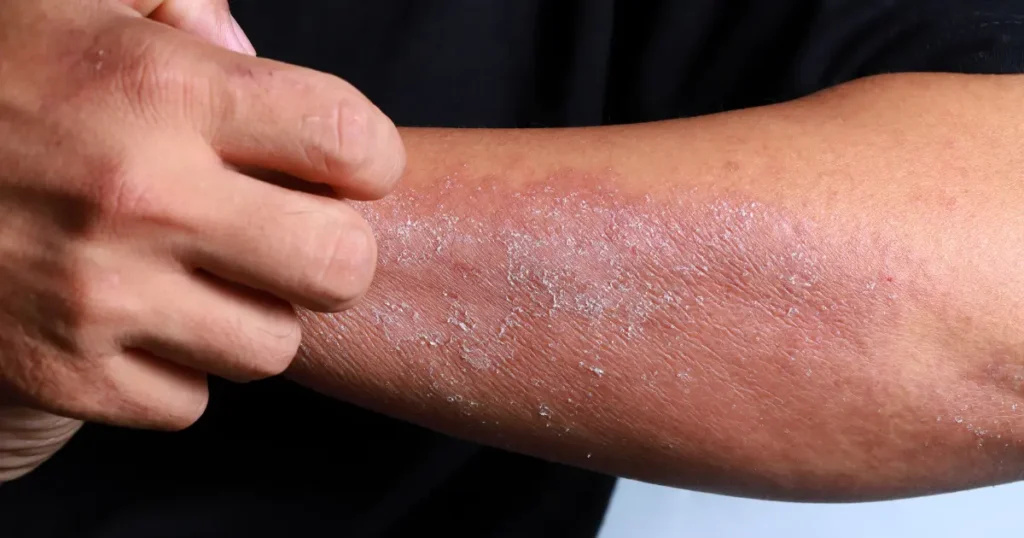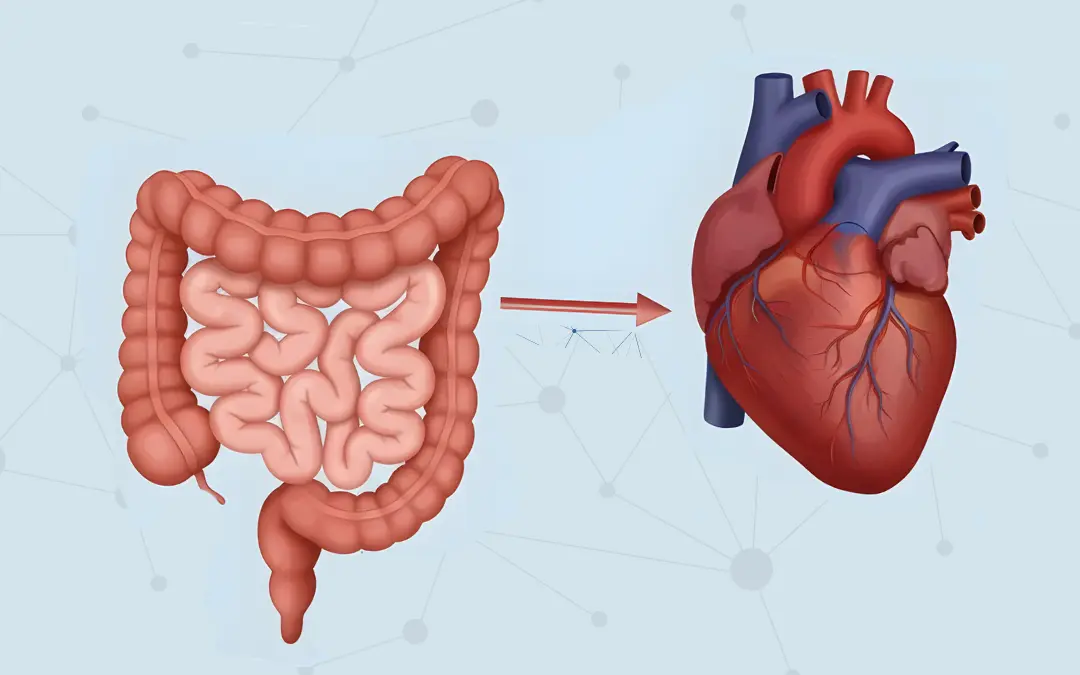- Written by Dr. Latha V. Chandu , (Sr Consultant, UWAY Health) Bangalore’s “renowned” Ayurveda Gastrointestinal Specialist
Welcome to our in-depth guide on understanding and managing allergies through Ayurveda. I’m Dr. Latha. C., senior specialist at UWAY.
What Patients Miss: Many people dismiss allergies as minor inconveniences. However, recognising the true nature of your symptoms is crucial, as what appears to be a simple allergic reaction could indicate deeper health imbalances. Today, we will explore how to accurately identify allergic reactions and discuss our unique Ayurveda treatment for allergies, including various allergy types.
Identifying Allergies:
A Comprehensive Look When you suspect an allergy, recognising the specific signs and symptoms, which vary with the type of allergy, is essential. Here’s what to consider:
Allergic Reactions:
The most common indicators include sneezing, itching, nasal congestion, and skin rashes. In severe cases, symptoms may escalate to swelling, breathing difficulties, and dizziness, pointing towards more acute allergic responses.
Timing and Exposure:
Pay close attention to when symptoms occur. Allergic reactions generally manifest shortly after exposure to an allergen, such as certain foods, environments, or during specific seasons known to proliferate allergens like pollen.
Types of Symptoms:
Food Allergies:
These might manifest as digestive disturbances, hives, or facial swelling.

Seasonal Allergies:
Commonly present with respiratory symptoms such as sneezing and a runny nose.
Contact Allergies:
These arise from contact with allergenic materials like latex, leading to skin rashes or irritation.
Repetitive Symptoms:
Experiencing similar symptoms repeatedly under similar circumstances is a strong indication of an underlying allergy.
Severity of Symptoms:
Note the severity, as some reactions can progress to anaphylaxis, a potentially life-threatening condition.
Family History:
Allergies often have a genetic component, so a family history of allergies is a significant indicator.

Ayurvedic Perspective on Allergies
In Ayurveda, allergies are understood as imbalances in the body’s doshas—Vata, Pitta, and Kapha. Here’s how these imbalances may present and how Ayurvedic treatment for allergies can help:
- Vata Imbalance: Typically manifests as symptoms like dry cough or wheezing.
- Pitta Imbalance: Can cause inflammation and rashes, indicative of a heated imbalance.
- Kapha Imbalance: Often leads to congestion and excessive mucus production.
Common Allergies Treated at UWAY
At UWAY, we address a wide spectrum of allergies, which include but are not limited to:
- Ayurveda and Seasonal Allergies: Including treatments for conditions like hay fever.
- Ayurveda Solutions for Food Allergies: Managing sensitivities such as dairy intolerance and gluten sensitivity.
- Skin Allergies Treatment in Ayurveda: Offering natural remedies for eczema and urticaria.

- Respiratory Allergies and Ayurveda: Focused on managing allergic asthma.
- Ayurvedic Remedies for Dust and Pet Allergies: Techniques to alleviate reactions to dust mites and pet dander.
- Digestive Allergies Managed by Ayurveda: Approaches to treat lactose intolerance and other Digestive Allergies.
Root Causes and Ayurveda Treatment for Allergies
In Ayurveda, understanding the root causes of an ailment is paramount to its effective treatment. Allergies, regardless of their type, are no exception. The underlying issues typically fall into two broad categories:
1. Ama (Toxins):
Central to Ayurvedic diagnosis is the concept of ‘Ama’, or toxins, which are substances that have not been completely digested. These toxins can accumulate in the body over time due to a variety of reasons, primarily poor digestion. When Ama accumulates, it tends to block the Srotas (channels) in the body which are vital pathways that nutrients and energy flow through. This blockage not only disrupts this flow but also triggers the immune system to respond, which in the case of allergies, manifests as an overreaction to harmless external stimuli. The treatment, therefore, involves cleansing the body of these toxins, enhancing the digestive fire (Agni), and restoring the proper function of the channels. This is often achieved through a combination of dietary adjustments, herbal treatments, and detoxification therapies such as Panchakarma.
2. Diet and Lifestyle:
- Ayurveda teaches that our daily choices have a profound impact on our overall health. Improper dietary habits and lifestyle choices can lead to an imbalance in the Doshas (Vata, Pitta, and Kapha). Each dosha corresponds to certain bodily functions and elements, and an imbalance can manifest physically in various ways, including allergies. For instance:
- Vata Imbalance: Often caused by excessive consumption of dry, cold, or stale food, irregular eating and sleeping habits, leading to symptoms like dry skin, digestive issues, and respiratory problems akin to allergic reactions.
- Pitta Imbalance: Triggered by excess intake of hot, spicy, or acidic foods, leading to inflammation, rashes, and burning sensations, symptoms commonly associated with allergic responses.
- Kapha Imbalance: Typically results from overconsumption of sweet, oily, or dairy products and a lack of physical activity, resulting in congestion, mucus production, and weight gain.
Treatment Protocols at UWAY
Our treatment process involves a holistic approach tailored to each individual, emphasising Ayurveda treatment for allergies:
- Initial Consultation: Understanding the patient’s diet, family history, emotional health, and medical past.
- Lifestyle Modifications: Specific changes are recommended based on the diagnosis.
- Yoga and Breathing Exercises:Customisedd to each patient’s needs to enhance body balance and reduce symptoms.
- Ayurvedic Medications:We utilise Weutilisee time-tested Kerala Ayurvedic medicines primarily based on herbal components.
- Detoxification Therapies: Including therapies like Panchakarma, which are recommended in severe cases or as a last resort.
In Ayurveda, pinpointing the exact root cause of allergies is often more critical than the actual treatment.
At UWAY, we understand that there’s no simple pill or drug that offers a long-term solution for allergies, as many might claim. Instead, each treatment plan is carefully customised to suit the individual, focusing on holistic healing and sustained health through Ayurveda treatment for allergies.
This approach highlights that diagnosing allergies is more challenging than treating them, marking a significant difference in how we manage these conditions. We aim for comprehensive care that goes beyond temporary relief, offering a path to lasting wellness tailored specifically to each person’s needs through our specialised Ayurveda treatment for allergies.
Our commitment to providing the best Ayurveda treatment for allergies ensures that patients receive holistic and personalised care.
About Author

Dr. Latha
Specializing in chronic health issues, she is a trusted practitioner for conditions like obesity, PCOS, migraines, allergic rhinitis, infertility, Sciatica, and osteoarthritis, particularly among women and children.







